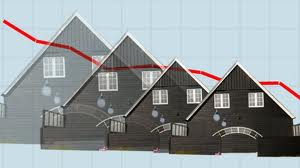Mortgage lenders and brokers in the United States were stunned on Wednesday, January 30th by the Weekly Application Survey released by the Mortgage Bankers Association (MBA).
 Mortgage lenders and brokers in the United States were stunned on Wednesday, January 30th by the Weekly Application Survey released by the Mortgage Bankers Association (MBA). A slight uptick in mortgage interest rates from 3.62 to 3.67 percent caused the survey's seasonally unadjusted Market Composite Index by 17 percent from the previous week, and refinance volume was the most affected with a 10 percent decline.
Mortgage lenders and brokers in the United States were stunned on Wednesday, January 30th by the Weekly Application Survey released by the Mortgage Bankers Association (MBA). A slight uptick in mortgage interest rates from 3.62 to 3.67 percent caused the survey's seasonally unadjusted Market Composite Index by 17 percent from the previous week, and refinance volume was the most affected with a 10 percent decline.
Wholesale mortgage originators in California interviewed by CNBC talked about complacency by borrowers who have been spoiled by the Federal Reserve Bank's interventionist monetary policy. It has been more than a year since the Fed announced Operation Twist, which was followed by a third round of quantitative easing (QE3). At their lowest levels last year, mortgage interest rates in the U.S. were around the same levels as they were when President Eisenhower was in the White House.
Different Opinions on the Refinance Market
A very cautious take on the latest MBA survey explains that mortgage loan officers and the Fed have done everything in their power to stimulate refinance activity. The benchmark 30-year fixed mortgage has been at under four percent for about 16 consecutive months. This gloomy theory posits that after the Home Affordable Refinance Program (HARP) has been exhausted, there may be no borrowers left to refinance.
A sunnier look on the matter comes the 12 percent of borrowers who are currently paying for an adjustable rate mortgage (ARM). Some of these borrowers may actually be enjoying rates just under three percent, but not for long. The latest increase in rates may send those borrowers scrambling to refinance into a fixed rate product, but what about the other 88 percent of homeowners who are already fixed into incredibly low rates?
Waiting on the Fed's Next Move
Should the Fed put a stop to QE3, the secondary mortgage market could slow down considerably and rates could turn upward. In fact, if the herd instinct of mortgage investors points to a QE3 deceleration, rates could go up and refinance activity would immediately suffer. The consensus is that QE3 may continue until at least the summer of 2013.
There may come a point in the housing recovery when refinance activity will take a backseat to the purchase market, which is even more worrisome. Current conditions are optimal for qualified buyers to take advantage of, but there is also a concern among mortgage originators that the market may also run out of those buyers. Under the current strict mortgage lending environment, a depletion of HARP borrowers and first-time home buyers would be extremely detrimental for the recovery.



